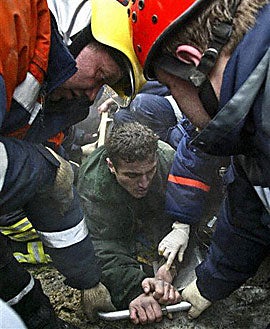Your support helps us to tell the story
From reproductive rights to climate change to Big Tech, The Independent is on the ground when the story is developing. Whether it's investigating the financials of Elon Musk's pro-Trump PAC or producing our latest documentary, 'The A Word', which shines a light on the American women fighting for reproductive rights, we know how important it is to parse out the facts from the messaging.
At such a critical moment in US history, we need reporters on the ground. Your donation allows us to keep sending journalists to speak to both sides of the story.
The Independent is trusted by Americans across the entire political spectrum. And unlike many other quality news outlets, we choose not to lock Americans out of our reporting and analysis with paywalls. We believe quality journalism should be available to everyone, paid for by those who can afford it.
Your support makes all the difference.The snow-covered roof of a large Moscow market collapsed early today, killing at least 40 people and forcing rescuers to clear away concrete slabs and metal beams to reach possible survivors trapped in the wreckage.
Rescue workers used metal cutters and hydraulic lifters to clear the ruins of steel and concrete pieces. Others used pickaxes to cut holes in the wreckage and knelt to call into the holes in search of survivors.
Mayor Yuri Luzhkov, who went to the site to oversee rescue efforts, said terrorism was unlikely. "Chances are more than 90 per cent that a terrorist act can be ruled out," he said. "It was a technical accident."
Twenty-nine people were injured and most of them were taken to hospital, emergency officials said.
Medical workers inserted an intravenous drip to administer painkillers and other medication to a man trapped under a slab of concrete that left only his hand visible. Rescuers used heat guns to blow warm air into the rubble to try to prevent victims from succumbing to near-freezing temperatures.
Trapped survivors were using mobile phones to call their relatives, helping rescuers zero in on their location, said Yuri Akimov, deputy head of the Moscow department of the Emergency Situations Ministry.
The victims were municipal and market workers, and Mayor Yuri Luzhkov said all the dead were guest workers from outside Moscow. Channel One said they had spent the night in the Bauman Market, which was not open for retail business. Ekho Moskvy radio reported that there could also have been wholesale buyers in the building.
No sounds could be heard from beneath the rubble though sniffer dogs indicated there were still survivors there, said Emergency Situations Ministry spokesman Viktor Beltsov.
"There may be people alive under there but time is passing," Beltsov said, adding that many panels had fallen on top of one another "so it would be hard for a person to be (alive) in there." He said 31 people had been confirmed dead by early afternoon.
Earlier, Emergency Situations Minister Sergei Shoigu told reporters that trapped survivors could be heard "knocking and crying out."
Investigators were looking at three possible causes of the collapse: improper maintenance of the building, a build up of snow and errors in the building's design, Moscow prosecutor Anatoly Zuyev said.
Two to three inches of wet snow had fallen overnight, on top of 18 inches that had fallen since the start of winter, the Russian Weather Service said.
Ekho Moskvy radio said the entire roof, covering an area of about 2,400 square yards, had fallen onto the market stalls.
"The main task now is not to let the building collapse further," Akimov said.
Luzhkov said the roof was designed to clear itself of snow.
"The roof was designed to take a large amount of snow cover, and there was a special gutter pipe that was always left open so the melted snow could run down, so there was no special need to have the roof cleared of snow," the mayor said.
Prosecutors have opened a criminal investigation on charges of negligence leading to the deaths of two or more people, RIA-Novosti said.
Ukhtai Salmanov, a 52-year-old herb-seller from Azerbaijan, said he had been heading out of the market at about 4.50am (0150 GMT). Near one of the exits, "I heard a loud noise and I fell to the ground and lost consciousness. When I came to, I was lying by the entrance.
"There was smoke and people were screaming," Ukhtai said, his clothes covered in dust.
Fighting back tears, he said his three sisters, who also worked in the market, were killed. There was no way he could have saved anyone, he said, because a mound of rubble blocked him from reaching them.
A crowd of relatives of market workers stood outside the police tape, crying and shouting.
Electric generators hummed, and every few minutes the more than 150 rescuers turned off all the equipment and stood silently to listen for signs of life.
Utility workers dismantled trolley-bus lines running close to the market to allow heavy equipment to manoeuvre through the narrow streets of the old neighbourhood.
Interfax said that the market had been designed in the 1970s by Nodar Kancheli, the same architect who drafted the plans for Moscow's Transvaal water park, where the roof collapsed in February 2004, killing 28 people. Prosecutors have blamed that collapse on design flaws.
Kancheli visited the market, one of the capital's largest, early today.
"I think one possibility is a big build up of snow," Kancheli told Ekho Moskvy radio. "And they set up kiosks on the mezzanine, which was not originally planned."
He said that corrosion also could have played a role.
Luzhkov said that the Bauman Market was among buildings designed by Kancheli's firm that had been checked for safety after the Transvaal disaster.

Join our commenting forum
Join thought-provoking conversations, follow other Independent readers and see their replies
Comments